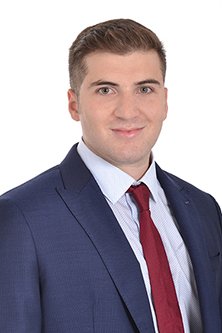Evangelos Santas
My experience of studying at Bayes was unforgettable, marked by busy weeks and funny chit-chats over coffee with my coursemates between classes. I was inspired by my teachers’ lectures as they are all leaders in their respective research fields and really made me go above and beyond in order to reach my goals.

Why did you choose to study Financial Mathematics at Bayes Business School?
I’ve always been fascinated by the world of finance. I remember myself watching my favourite actors in a finance movie, arguing about some complex investment ideas, and wanting to be like them.
My Bachelor’s in Mathematics had given me an ideal background of being able to understand the hidden relationships behind the models that rule the finance world. Consequently, I decided to come to London and Bayes Business School with the aim to learn how these models can be used to facilitate financial decisions.
Being part of the City of London and familiarising myself with the City’s vibrant atmosphere prior to starting working was a key motivator in choosing to study at Bayes Business School.
My experience of studying at Bayes was unforgettable, marked by busy weeks and funny chit-chats over coffee with my coursemates between classes. I was inspired by my teachers’ lectures as they are all leaders in their respective research fields and really made me go above and beyond in order to reach my goals.
Even though towards the end of my second term a global pandemic arose, I enjoyed the online classes and believe that I gain on the same lecture quality as in it was in person as Bayes had already a robust online lesson infrastructure.
How did your master’s impact your career?
Currently, I am working as a Data Analyst at StoneX and specifically at their brokerage division. My role involves analysing our clients’ data using mathematical models in order to discover insightful trends that aim to help the business’ stakeholders make data-driven decisions. I believe my master’s already has had a great impact on my career and progression.
Throughout my studies at Bayes, I developed important transferable skills that are useful for all office environments and also Finance-specific industry knowledge that gave me an edge against the competition in the interview process.
My courses have given me the necessary tools to carry out work projects independently. Skills like cross-referencing with different sources and validating my output through testing methodologies have been proven essential in delivering accurate results prior to the deadline. Moreover, the demanding exams and the tight project deadlines pushed me to be better at multitasking and helped me cultivate a can-do attitude toward any task no matter how difficult it might initially seem. This skill proved to be very useful later in my workplace.
In addition, at Bayes, I had the opportunity to be part of the Actuarial, Insurance, Risk and Quants Society that gave me not only the opportunity to be active within the student community but also to develop and practice my organisational and communication skills.
What advice do you have for students considering Financial Mathematics?
If you are passionate about Mathematics and Programming, if the financial markets is a topic that excites you and love to read FT articles when you have the chance then I would advise to stop considering it and go for the MSc in Financial Mathematics at Bayes.
The MSc Alumnus are equipped with strong technical skills that match with quant roles, traditional finance roles and data science & analytics roles. So the doors open and the career opportunities after graduation are vast.
Before deciding on a master’s, I would advise you to learn as much as possible about the industry and the role you are interested in. Learning what skills are useful, what academic topics are relevant in the industry and what is included in the “day of life” of the career you want to pursue. This will help you to decide if Financial Mathematics is the right master’s for you and also where to focus your attention whilst on your studies and job search.
Once you begin your studies, I would advise you to prioritise knowledge gap-filling, especially on the topics less relevant to your prior background. I would also advise you to firstly focus on understanding the concepts and not just practicing exercise solutions. A deep understanding of the concepts is the only way knowledge stays rooted within you and the only way to tackle questions that first come up during an exam or an interview.
The topics covered in the MSc are all relevant to the industry’s latest updates and I would encourage you to build a strong foundation in each one of them, all-around knowledge is a very useful skill later in the workplace, and of course, give extra weight to the one you are more passionate about and would like to build a career around.